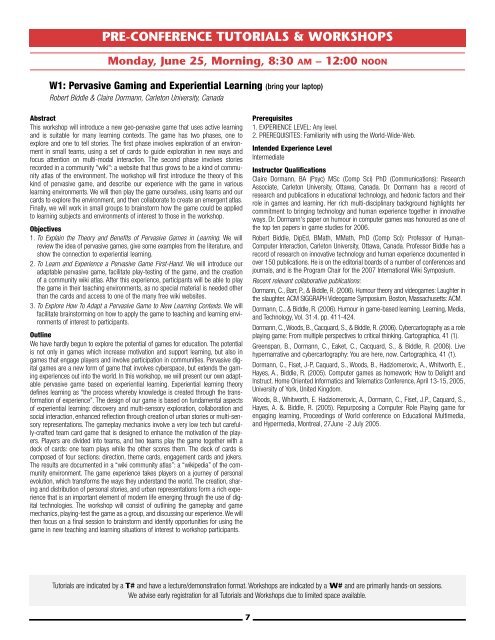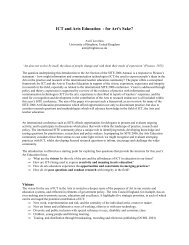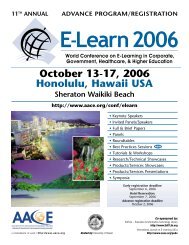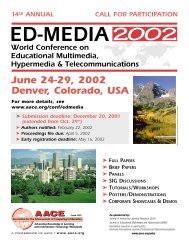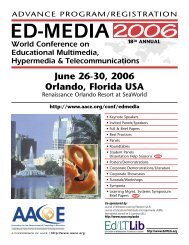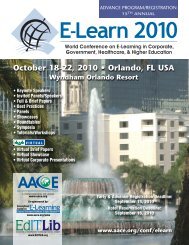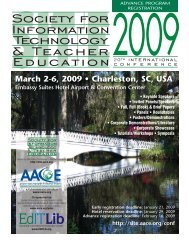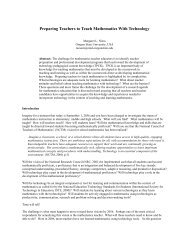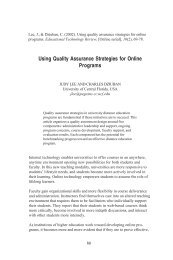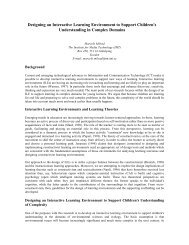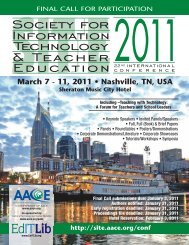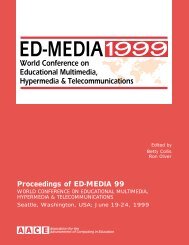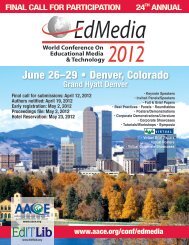June 25-29, 2007 Vancouver BC, Canada - Association for the ...
June 25-29, 2007 Vancouver BC, Canada - Association for the ...
June 25-29, 2007 Vancouver BC, Canada - Association for the ...
Create successful ePaper yourself
Turn your PDF publications into a flip-book with our unique Google optimized e-Paper software.
PRE-CONFERENCE TUTORIALS & WORKSHOPS<br />
Monday, <strong>June</strong> <strong>25</strong>, Morning, 8:30 AM – 12:00 NOON<br />
W1: Pervasive Gaming and Experiential Learning (bring your laptop)<br />
Robert Biddle & Claire Dormann, Carleton University, <strong>Canada</strong><br />
Abstract<br />
This workshop will introduce a new geo-pervasive game that uses active learning<br />
and is suitable <strong>for</strong> many learning contexts. The game has two phases, one to<br />
explore and one to tell stories. The first phase involves exploration of an environment<br />
in small teams, using a set of cards to guide exploration in new ways and<br />
focus attention on multi-modal interaction. The second phase involves stories<br />
recorded in a community "wiki": a website that thus grows to be a kind of community<br />
atlas of <strong>the</strong> environment. The workshop will first introduce <strong>the</strong> <strong>the</strong>ory of this<br />
kind of pervasive game, and describe our experience with <strong>the</strong> game in various<br />
learning environments. We will <strong>the</strong>n play <strong>the</strong> game ourselves, using teams and our<br />
cards to explore <strong>the</strong> environment, and <strong>the</strong>n collaborate to create an emergent atlas.<br />
Finally, we will work in small groups to brainstorm how <strong>the</strong> game could be applied<br />
to learning subjects and environments of interest to those in <strong>the</strong> workshop.<br />
Objectives<br />
1. To Explain <strong>the</strong> Theory and Benefits of Pervasive Games in Learning. We will<br />
review <strong>the</strong> idea of pervasive games, give some examples from <strong>the</strong> literature, and<br />
show <strong>the</strong> connection to experiential learning.<br />
2. To Learn and Experience a Pervasive Game First-Hand. We will introduce our<br />
adaptable pervasive game, facilitate play-testing of <strong>the</strong> game, and <strong>the</strong> creation<br />
of a community wiki atlas. After this experience, participants will be able to play<br />
<strong>the</strong> game in <strong>the</strong>ir teaching environments, as no special material is needed o<strong>the</strong>r<br />
than <strong>the</strong> cards and access to one of <strong>the</strong> many free wiki websites.<br />
3. To Explore How To Adapt a Pervasive Game to New Learning Contexts. We will<br />
facilitate brainstorming on how to apply <strong>the</strong> game to teaching and learning environments<br />
of interest to participants.<br />
Outline<br />
We have hardly begun to explore <strong>the</strong> potential of games <strong>for</strong> education. The potential<br />
is not only in games which increase motivation and support learning, but also in<br />
games that engage players and involve participation in communities. Pervasive digital<br />
games are a new <strong>for</strong>m of game that involves cyberspace, but extends <strong>the</strong> gaming<br />
experiences out into <strong>the</strong> world. In this workshop, we will present our own adaptable<br />
pervasive game based on experiential learning. Experiential learning <strong>the</strong>ory<br />
defines learning as “<strong>the</strong> process whereby knowledge is created through <strong>the</strong> trans<strong>for</strong>mation<br />
of experience”. The design of our game is based on fundamental aspects<br />
of experiential learning: discovery and multi-sensory exploration, collaboration and<br />
social interaction, enhanced reflection through creation of urban stories or multi-sensory<br />
representations. The gameplay mechanics involve a very low tech but carefully-crafted<br />
team card game that is designed to enhance <strong>the</strong> motivation of <strong>the</strong> players.<br />
Players are divided into teams, and two teams play <strong>the</strong> game toge<strong>the</strong>r with a<br />
deck of cards: one team plays while <strong>the</strong> o<strong>the</strong>r scores <strong>the</strong>m. The deck of cards is<br />
composed of four sections: direction, <strong>the</strong>me cards, engagement cards and jokers.<br />
The results are documented in a “wiki community atlas”: a “wikipedia” of <strong>the</strong> community<br />
environment. The game experience takes players on a journey of personal<br />
evolution, which trans<strong>for</strong>ms <strong>the</strong> ways <strong>the</strong>y understand <strong>the</strong> world. The creation, sharing<br />
and distribution of personal stories, and urban representations <strong>for</strong>m a rich experience<br />
that is an important element of modern life emerging through <strong>the</strong> use of digital<br />
technologies. The workshop will consist of outlining <strong>the</strong> gameplay and game<br />
mechanics, playing-test <strong>the</strong> game as a group, and discussing our experience.We will<br />
<strong>the</strong>n focus on a final session to brainstorm and identify opportunities <strong>for</strong> using <strong>the</strong><br />
game in new teaching and learning situations of interest to workshop participants.<br />
Prerequisites<br />
1. EXPERIENCE LEVEL: Any level.<br />
2. PREREQUISITES: Familiarity with using <strong>the</strong> World-Wide-Web.<br />
Intended Experience Level<br />
Intermediate<br />
Instructor Qualifications<br />
Claire Dormann, BA (Psyc) MSc (Comp Sci) PhD (Communications): Research<br />
Associate, Carleton University, Ottawa, <strong>Canada</strong>. Dr. Dormann has a record of<br />
research and publications in educational technology, and hedonic factors and <strong>the</strong>ir<br />
role in games and learning. Her rich multi-disciplinary background highlights her<br />
commitment to bringing technology and human experience toge<strong>the</strong>r in innovative<br />
ways. Dr. Dormann's paper on humour in computer games was honoured as one of<br />
<strong>the</strong> top ten papers in game studies <strong>for</strong> 2006.<br />
Robert Biddle, DipEd, BMath, MMath, PhD (Comp Sci): Professor of Human-<br />
Computer Interaction, Carleton University, Ottawa, <strong>Canada</strong>. Professor Biddle has a<br />
record of research on innovative technology and human experience documented in<br />
over 150 publications. He is on <strong>the</strong> editorial boards of a number of conferences and<br />
journals, and is <strong>the</strong> Program Chair <strong>for</strong> <strong>the</strong> <strong>2007</strong> International Wiki Symposium.<br />
Recent relevant collaborative publications:<br />
Dormann, C., Barr, P., & Biddle, R. (2006). Humour <strong>the</strong>ory and videogames: Laughter in<br />
<strong>the</strong> slaughter. ACM SIGGRAPH Videogame Symposium. Boston, Massachusetts: ACM.<br />
Dormann, C., & Biddle, R. (2006). Humour in game-based learning. Learning, Media,<br />
and Technology, Vol. 31:4. pp. 411-424.<br />
Dormann, C., Woods, B., Cacquard, S., & Biddle, R. (2006). Cybercartography as a role<br />
playing game: From multiple perspectives to critical thinking. Cartographica, 41 (1).<br />
Greenspan, B., Dormann, C., Eaket, C., Cacquard, S., & Biddle, R. (2006). Live<br />
hypernarrative and cybercartography: You are here, now. Cartographica, 41 (1).<br />
Dormann, C., Fiset, J-P, Caquard, S., Woods, B., Hadziomerovic, A., Whitworth, E.,<br />
Hayes, A., Biddle, R. (2005). Computer games as homework: How to Delight and<br />
Instruct. Home Oriented In<strong>for</strong>matics and Telematics Conference, April 13-15, 2005,<br />
University of York, United Kingdom.<br />
Woods, B., Whitworth, E. Hadziomerovic, A., Dormann, C., Fiset, J.P., Caquard, S.,<br />
Hayes, A. &. Biddle, R. (2005). Repurposing a Computer Role Playing game <strong>for</strong><br />
engaging learning, Proceedings of World conference on Educational Multimedia,<br />
and Hypermedia, Montreal, 27<strong>June</strong> -2 July 2005.<br />
Tutorials are indicated by a T# and have a lecture/demonstration <strong>for</strong>mat. Workshops are indicated by a W# and are primarily hands-on sessions.<br />
We advise early registration <strong>for</strong> all Tutorials and Workshops due to limited space available.<br />
7


